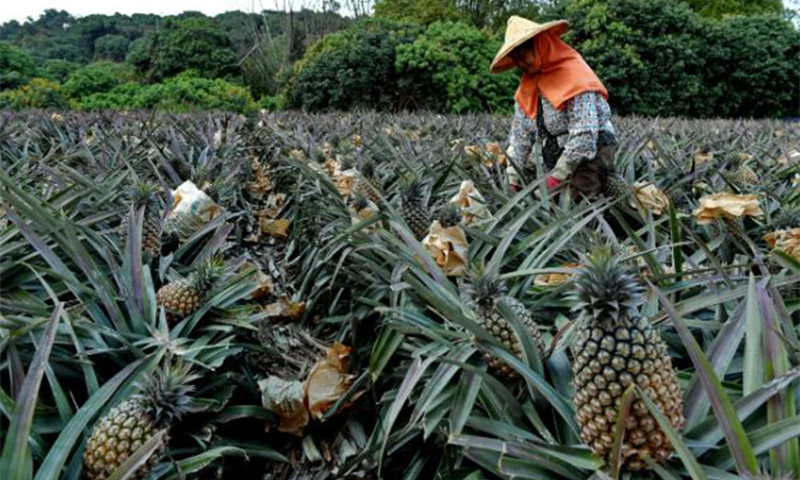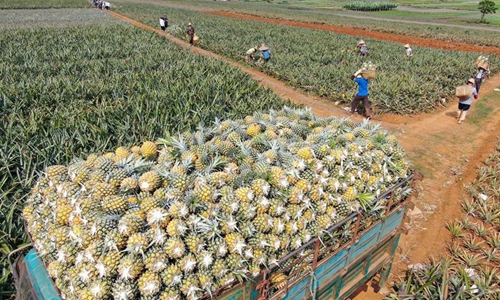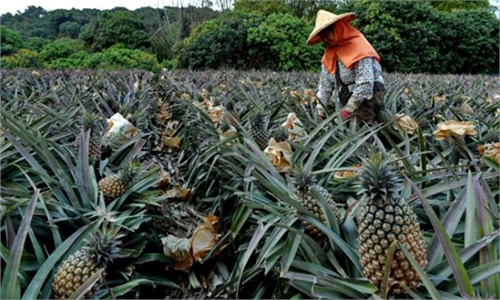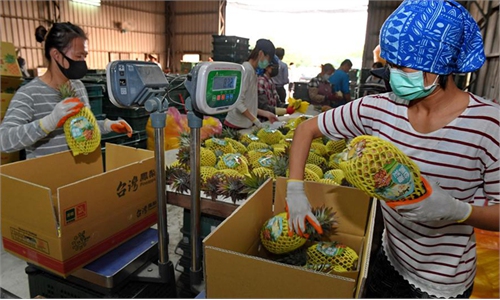
A farmer in Kaohsiung harvests pineapples in March 2019. (Photo: Xinhua)
After the Chinese mainland announced its temporary ban, starting from Monday, on pineapples from the island of Taiwan to ensure biosecurity due to the detection of pests, the secessionist Democratic Progressive Party (DPP) authority that rules the island is trying to shift the blame to the mainland by claiming the ban is a "political practice." Mainland experts said the DPP authority is hyping the mainland's standard quarantine inspection measure in an attempt to politicize the matter to serve its own interests.
Starting March 1, mainland customs will suspend pineapple imports from Taiwan after quarantine authorities frequently detected pests on the tropical fruit coming from Taiwan since 2020, according to a notice published on the website of the General Administration of Customs (GAC) on Friday.
The import suspension, as a normal biosafety precaution measure, is scientific and reasonable, in line with the relevant laws and standards of the mainland, Ma Xiaoguang, spokesperson for the Taiwan Affairs Office of the State Council, said on Friday.
However, the DPP authority claimed that the mainland's decision comes amid the pineapple harvest season, which could cause great losses to the industry, so it said the ban is "unacceptable." The authority even asked foreign countries to buy Taiwan's "Freedom Pineapple" since it wants to make it seem like the "mainland is bullying the island."
Chinese mainland experts noted that importing fruits from other regions or countries should always be based on safety of the mainland customers, and that fruit imports from Taiwan are not just a business activity as the mainland has given up great amounts of profits to take care of Taiwan compatriots. When the DPP authority is being extremely hostile toward the mainland, it would be unfair to ask the mainland to stay friendly unconditionally.
Li Xiaobing, a Taiwan studies expert at Nankai University in Tianjin, told the Global Times that when the cross-Straits exchanges remained normal in the past, this kind of problem would not cause significant losses as the two sides could find solutions through coordination and cooperation, but today, communication and exchanges have been seriously damaged by the secessionist DPP authority. "The DPP is the one who should be blamed."
The mainland has long been Taiwan's most vital pineapple export destination. Taiwan exported 41,661 tons of fresh pineapples to the mainland in 2020, accounting for 91 percent of the island's total pineapple exports that year, according to statistics from Taiwan's "Council of Agriculture".
It nonetheless does little harm to the mainland's pineapple market, where Taiwan-exported pineapples only account for a negligible part, industry insiders told the Global Times. Data showed that the mainland produced 1.72 million tons of pineapples in 2019, 33 times more than the 51,112 tons that it imported from Taiwan that year.

Aerial photo taken on March 27, 2020 shows a truck loaded with pineapples at Hanzhai Village in Xuwen County of Zhanjiang City, south China's Guangdong Province. The harvest season of pineapple here is coming. (Xinhua/Deng Hua)
The mainland's overall import suspension creates nearly TWD 1.5 billion ($53.9 million) of losses to Taiwan, estimated Taiwan media on Friday.
Li said the DPP and those in the island who naively believe that they do not need to pay any price after offending the mainland should realize that "it's absolutely stupid and arrogant to use the mainland's kindness toward Taiwan compatriots to earn economic profits, but at the same time, pursue secessionism and be hostile toward the mainland."
Lin Cheng-chieh, one of the founders of the DPP and a former "lawmaker" of the island, also found blaming the mainland on the pineapple ban is unfair. He said at an interview with Taiwan media that "Taiwan's economy is drinking the 'breast milk' from the mainland's body. The mainland has given up huge amounts of profits to us, but we have never been grateful. We always treat them as enemies."
"When Taiwan treats the mainland unfairly with hostility, how could you demand the mainland to be friendly?" Lin said.
The DPP authority has damaged cross-Straits ties on several occasions in the past few years, including supporting Hong Kong separatist forces in the 2019 turmoil and banning mask exports to the mainland in 2020 when COVID-19 hit Wuhan and the mainland was facing shortage of medical materials.
The DPP authority also followed the Trump administration's confrontational acts against China to ban mainland companies' legal activities and cultural exchanges in the island, and firms like Huawei, Taobao and iQIYI are all victims. Some senior DPP politicians and pro-secessionist media in the island even insist on naming COVID-19 with the racist and humiliating name of "Wuhan virus"
A Beijing-based expert on Taiwan affairs who asked for anonymity told the Global Times that these hostile acts by the DPP are the real "political practice," and they are not innocent at all. "They should be grateful as the mainland didn't sanction them economically in past two years."
Taiwan's pineapples and relevant products are mostly grown and produced in the southern part of the island, which mostly supports the separatist DPP, so this time, the ban based on biosafety reasons might let them realize that the mainland can make those secessionists suffer if they continue to support hostile approaches toward the mainland, the expert said.
"The pineapple business is just a small share of the cross-Straits trade, and the ban has already caused that much headache to the DPP. So let's think: What if the mainland gets further infuriated one day and chooses to use real sanctions to comprehensively strike the Taiwan economy? The mainland can let them know what the real pain is," the expert noted.
Experts said that other big shares of cross-Straits trade like semiconductor products, electroplates and numerically-controlled machine tools could all be targets if the mainland really wants to sanction the island.



